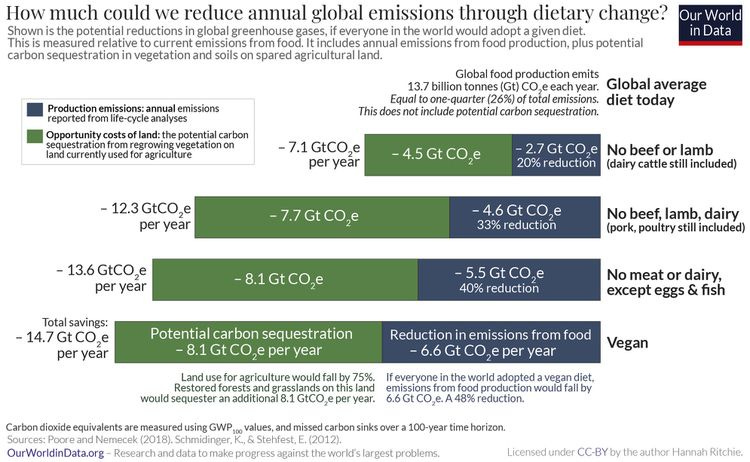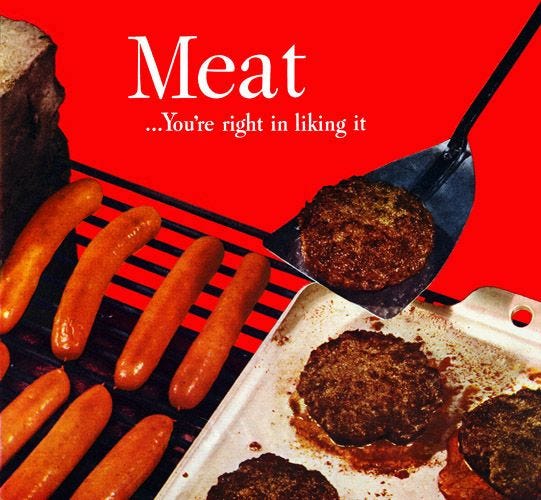Beef consumption is a global problem and meatwashing is making it worse
Jonathan Foley of Project Drawdown looks at the problems of greenwashing beef, and it isn't just the carbon footprint.
Dr. Jonathan Foley of Project Drawdown has written a powerful indictment of red meat titled “Greenwashing and denial won’t solve beef’s enormous climate problems.” It is a subject I have written about often (links at bottom); While trying to live the 1.5-degree lifestyle and reduce my carbon emissions to 2.5 tonnes per year, I avoided red meat. Cows are prodigious producers of greenhouse gases and chew up huge amounts of land.
The chart from Our World in Data said it all; a typical serving of beef could eat up an entire day’s carbon budget. Fortunately, we didn’t have to give up meat altogether; chicken and pork were relatively carbon-efficient, lower even than cheese and tomatoes (high because of hothouses and transportation). We had a nice local and seasonal “climatarian diet.” After I finished the book, I backslid a bit, and we enjoyed the occasional hamburger or steak. In my second book, The Story of Upfront Carbon, I have a chapter on hamburgers and conclude that you should “Walk to your nearest burger joint, and don’t do it often.” But reading Foley’s article has me thinking that meat should be off the menu again.
George Monbiot has been on this case for years, calling it “meatwashing”- “Claims that cattle ranching sequesters carbon and restores ecosystems have been used in highly effective marketing campaigns by the livestock industry. Just one problem: they’re greenwash.” Now, Foley looks at how the industry has been greenwashing beef.
The livestock industry has downplayed the role of meat and dairy production in climate change and other environmental problems. They have tried to obfuscate the sizeable climate impact of cattle’s methane emissions and have spread claims that cattle’s emissions are “natural” and mimic those of natural herbivores. Along the way, social media platforms – especially X/Twitter – have become overrun with disinformation. Some foreign governments have also jumped in, spreading false claims about beef’s impact as a way of fueling online “culture wars.”
We are definitely losing those. I wrote in The Story of Upfront Carbon:
“In 2019 Presidential advisor Sebastian Gorka complained about Democrats and their proposed Green New Deal: “They want to take your pickup truck. They want to rebuild your home. They want to take away your hamburgers. This is what Stalin dreamt about but never achieved.” Ignoring the fact that Stalin actually liked hamburgers and introduced them to Russia, Gorka seized on two icons of American life: the pickup truck and the hamburger.”
Five years since Gorka, we have more pickups than ever, and hamburger sales are up. Foley writes:
“Without a doubt, the livestock industry is winning the PR battle. Their greenwashing and denial efforts, powerful lobbying, and media campaigns are working. Still, sensible actions can eventually win out if we face the challenges of beef overconsumption, waste, and climate change head-on and address them with sound science, evidence-based solutions, and clear-eyed, fearless speech that stands up to misinformation.”
There is nothing new about the marketing and greenwashing. During the Second World War, people got out of the habit of eating a lot of meat, and the American Meat Institute was established to get it back on the table. Read the copy in this ad from 1946, full of cultural allusions and half-truths about health:
This is not just a piece of meat... this is something a man wants to come home to... something that helps children to grow... something that makes women proud of their meals.
This is a symbol of man's desire, his will to survive. For as old as man's instinct to live is his liking for meat. And to be satisfied in its eating. Is it any wonder that, as meat moves back to the Home Plate, we look on meat with new regard, not just for its enjoyment, but as a nutritional cornerstone of life?”
Our politics are meaty, too; the comments to this post from the leader of the opposition in Canada were all about how Liberals want us to eat bugs.
But when you look at the problems of conservative beef, liberal crickets look pretty good. Some of the issues raised by Foley:
Feedlots, known for cruelty and pollution. “Cattle are kept in cramped spaces, fed grain (mainly corn) and forage (mostly alfalfa and corn silage) while pumped full of antibiotics and growth hormones.”
Land use. “Devoting highly productive cropland to animal feed is an incredible waste of land and resources. To produce one calorie of edible feedlot beef requires about 30 calories of grain”
Water consumption. “ Irrigating alfalfa and other feed crops consumes roughly half of the water withdrawn from the Colorado River. Much of the water in the American West is devoted to irrigating animal feed and forage crops.”
Biodiversity loss.
Pollution. “Beyond the emissions from land use, the world’s 1.5 billion cattle also burp enormous quantities of methane.”
Foley goes on to debunk grass-fed “regenerative” beef and methane-reducing additives as being “only marginally helpful in reducing emissions. And they may only be economically viable in limited circumstances, such as feedlot dairy production.”
In my books, the recommendations did not include crickets (though I have tried them, and they’re not bad!). They included eating beef less often, controlling portion size, and reducing food waste. Foley says pretty much the same thing:
“These are not extreme actions. No serious person is calling for us all to become vegans overnight. I certainly am not, and I still eat some meat – but less than I used to. We can take a sensible view of our current food system, make a few modest changes to curb waste and dietary excess, and dramatically improve our health, our farming systems, our environment, and our future.”
I agree with Foley that we are not going to become vegans overnight. However, reducing the consumption of beef and lamb is not nearly as hard, and as the OWID chart shows, it can make a huge difference.
Read it at Project Drawdown.
My earlier writing on the subject, not yet deleted:
Much Depends Upon Dinner. A climatarian diet is different.
The Best Diet for the Climate Crisis Takes Red Meat Off the Menu. There's one thing everyone agrees on: Less red meat
Cutting Out Beef Could Cut Agricultural Land Use In Half. Going vegan would reduce it by three-quarters.
Climate Impact Labels on Fast Food Reduce Red Meat Consumption. Negative labels work better than positive ones.









I have read Foley, and your piece, and basically agree. I would add that there is a role for animals in agriculture, just as there are in ecosystems. After all, grazing animals evolved in ecosystems, as did seed and insect eaters like chickens, and ground grubbers like pigs. The problem lies in raising them outside their ecosystems without the boundaries provided by predators, who keep them from eating the ecosystems to death. Cattle overgraze if not chased by wolves, or their human managers. Rapid rotational grazing, including on cropland, as recommended by Holistic Management, within ecosystems where grazers are native, works. Raising pigs in a forest, like in Corsica, and this can be done in closed canopy forest of the eastern US, also works. Raising chickens in warmer, mixed use landscapes with lots of cover also works, as they are native to these places (SE Asia). Serious problems arise with all three animals because we grow them and feed them outside the boundaries of their natural ecosystems. Our animal protein production system got so far out of synch because of vertical integration in the industry that depends on externalizing costs to the environment. Increased methane production is just one, and likely not as serious as leaks from the fracking industry. More serious problems stem from massive nutrient overloads in aquatic ecosystems due to intended and unintended leaks via runoff, leaching, erosion and more, either from fertilizer losses on farms, or manure losses from confined animal feeding operations. This meat production system is entirely broken and needs a total redesign if we are to heal violated planetary boundaries.
Also, stopping deforestation in the Amazon, related to beef production, is of highest global priority--we need to safely avoid a tipping point in the rainforest, and some experts are giving warnings about the limits of deforestation.